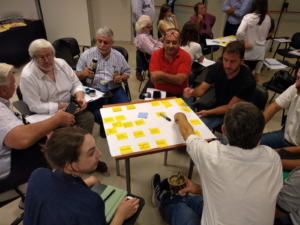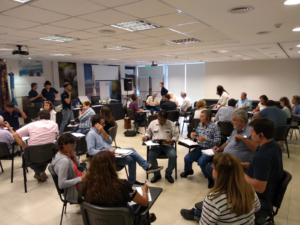
As part of the Global Locust Initiative Lab’s FFAR project on coupled human-system approaches to solving locust plagues, also supported by ASU’s Swette Center for Sustainable Food Systems, workshops have been organized in South America, Sénégal and Australia to identify and address institutional barriers to sustainable locust management.
The first workshop took place in Tucumán, Argentina, on February 26 and 27, 2020. It brought together 38 participants from Argentina, Bolivia, Paraguay and Uruguay working in national and provincial locust control agencies, as well as researchers, farmers and representatives of farming associations and ministries. Using a participative methodology with tools, such as collaborative social mapping, participants were invited to share their point of views regarding governance issues in the case of the South American locust (Schistocerca cancellata) over a day and a half. They explained the current situation characterized by regular outbreaks of S. cancellata, identified the main actors involved in the governance system, characterized the interactions among these agents, and discussed the main strengths, opportunities for improvement, and threats for the sustainable governance of the South American locust.
The synthesis of the workshop is currently being written, but some preliminary results can already be shared. The explanations that emerged from the workshop to explain the current situation characterized by regular outbreaks in the past five years consist of three main elements: environmental changes and climate change in particular, the lack of long-term and coordinated policies especially at the regional scale, and discontinuous monitoring leading to a lack of reliable, up-to-date information.
The social map of the governance structure focused mostly on the national level and on the articulation with research, provincial governments, farmers and their representatives. Among the links to be strengthened, the participants insisted on the involvement of research institutions, producers, and environmental stakeholders, such as the ministry of the environment. The last five years have helped to enhance knowledge, coordination, and strengthened infrastructures mostly thanks to the commitment of people. However, participants acknowledge that they have come only partway to ensuring proper coordination, and that they still need to strengthen their links with key actors and consolidate coordination tools such as the Argentinian national program for locust management and the regional management plan for the South American locust.

This workshop was an opportunity to bring diverse participants together, promote knowledge sharing, and formalize what they experience on a daily basis. According to one of the participants:
"The more complex the problem is, the more stakeholders are involved. The more stakeholders involved, the more complex the relationships. We live that everyday, but we never think about that. We never formalize that. So this workshop gave us the opportunity to think about what we do on a daily basis, and to put some thoughts and ameliorate the way we work."
The results of this workshop will be compared to those that will emerge from the two upcoming workshops in Sénégal and Australia, thus highlighting commonalities and specificities for promoting coordination in locust management across the world.
